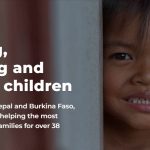August 8, 2020 at 11:35 pm: Millions of garment workers around the world have not received their regular wages, or have not been paid at all, for months since the start of the Covid-19 pandemic, shows a new report by Clean Clothes Campaign, launched today.

Khalid Mahmood, of Labour Education Foundation in Pakistan, says: “Many workers in the garment and textile industry have not been paid or have been underpaid because of order cancellations and Covid-19 lockdowns. As these workers were already living on poverty wages, they had not been able to save anything before the pandemic hit. The wage gaps caused by the crisis mean that workers are not able to feed their families properly, they are not able to pay for school fees of their children, or pay for medical expenses and that many of them are in debt. Most migrant workers had to go back to their villages and now it is becoming even more difficult for them to get back to their jobs and survive in big cities. ”
David Hachfeld, Public Eye/Clean Clothes Campaign Switzerland, says: “Because of lack of systematic data we had to base our estimates on assumptions and limit our research to seven countries in South and Southeast Asia. We have, however, no reason to believe the situation is significantly better in low-wage production hotspots that we did not research. Even though our estimates stay on the conservative side, they are quite shocking. We deduce in Indonesia and Bangladesh workers were collectively withheld respectively over 400 million and 500 million USD in owed wages over three months.”
Clean Clothes Campaign calls on apparel brands, retailers, and etailers to take responsibility to ensure that all workers in their supply chains receive the full wages they are owed in accordance to labour law and/or international standards by publicly committing to a wage assurance. This would require brands to commit to soliciting funds, provide direct contributions and work together with other stakeholders – such as in the existing International Labour Organization (ILO) Call to Action, but going beyond its limited mandate – to ensure that all workers making and handling their products receive the wages they are owed. Since launching this proposal in June, Clean Clothes Campaign has reached out to dozens of brands and started conversations with many of them on their responsibility to ensure the workers who make their clothes receive their full wages.
Christie Miedema, Clean Clothes Campaign International Office, says: “We welcome collaborative action among brands and retailers to ensure that they have sufficient leverage and share the costs of workers’ wages. We are asking brands individually to make a public commitment to avoid a situation in which everyone in a supply chain has responsibility, but in practice nobody assumes responsibility. Only if brands and retailers individually and publicly commit to a wage assurance can we avoid the traditional habit of pushing risks and responsibilities to others in the supply chain and make sure workers are not left covering the gap.”





